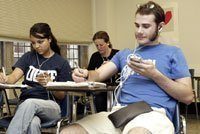Duke University junior Keith Rand said he has always struggled learning languages. In 2005, he confronted that challenge by taking an introductory Spanish course that packs two semesters of Spanish into one. It was also a class that is pioneering the use of iPod digital-audio players for education.
“I was kind of skeptical about [the iPods] at first to tell you the truth,” Rand said. “You know: ‘They’re giving out these free iPods as a marketing scheme for Apple.’ But it’s actually been really useful.”
Rand’s progress in his first-ever Spanish class is documented in recordings he made each week with his iPod for homework and tests. During his first week of class, Rand recorded a conversation with a classmate that is limited to the most basic Spanish phrases. After just two weeks of class, a recording of his first oral exams shows that his vocabulary is expanding. 
Visiting assistant professor Lisa Merschel is the course’s instructor. She said, when she first found out iPods would be available for her class, she was limited in her imagination about the pedagogical uses of the devices.
“In the first two days, I was thinking, ‘Well I would play some songs for them,’” she said. “And then after that I became much more imaginative in my use of the iPod and have expanded quite a bit and am surprised about how many ways I can use it to students’ benefit.”
Merschel had the students use the iPods to: hear dramatic recordings of the novellas they read; record responses during oral quizzes; play back her verbal comments on quizzes and homework; review the pronunciation of each week’s vocabulary words, a use suggested by a student; and listen to audio exercises inside and outside of class. She also assigned weekly “audio diary entries,” for which students recorded themselves speaking on a topic. She provided a handful of Spanish songs, like Gloria Estefan’s “Ayer.” (Legal permission to use songs for the class was negotiated by Duke’s Center for Instructional Technology.)
Rand says the iPods were most helpful when he did oral comprehension exercises in class, for which he listened to short segments on the iPod and then filled in blanks on a worksheet.
“We’re able to keep up [at] our own pace,” he said. Each student can focus on the sections most difficult to him by reviewing them on his iPod, Rand noted, without the entire class having to repeat those segments.
He also found useful the recordings of vocabulary words — “audio flash cards” — that Merschel records each week.
“I’ll come out of class and listen to vocabulary for a little bit,” he said.
This list of Spanish vocabulary words was recorded by Professor Lisa Merschel to make “audio flash cards” that students can listen to on their iPods to review pronunciation.
Another student, Lissa Smith, who worked full time on campus and audits the course, says she appreciated the convenience of being able to review pronunciation walking to school or driving.
“It’s especially nice for me because I often work and travel for my work,” she said, “and when there are places I can’t access a computer this is really great for me.”
Lauren Berkowitz commuted to the class from UNC, where she is sophomore. She liked how the iPods increase the number of ways she applies her burgeoning Spanish skills. Her only regret: as a UNC student, she’d have to turn in her iPod at the end of the semester.
Listen to a dramatic reading of the Don Juan Tenorio by Duke Spanish instructors, which students in an introductory Spanish course listen to on their iPods.

Listen to one student’s progress from Week One
 to Week Two
to Week Two
